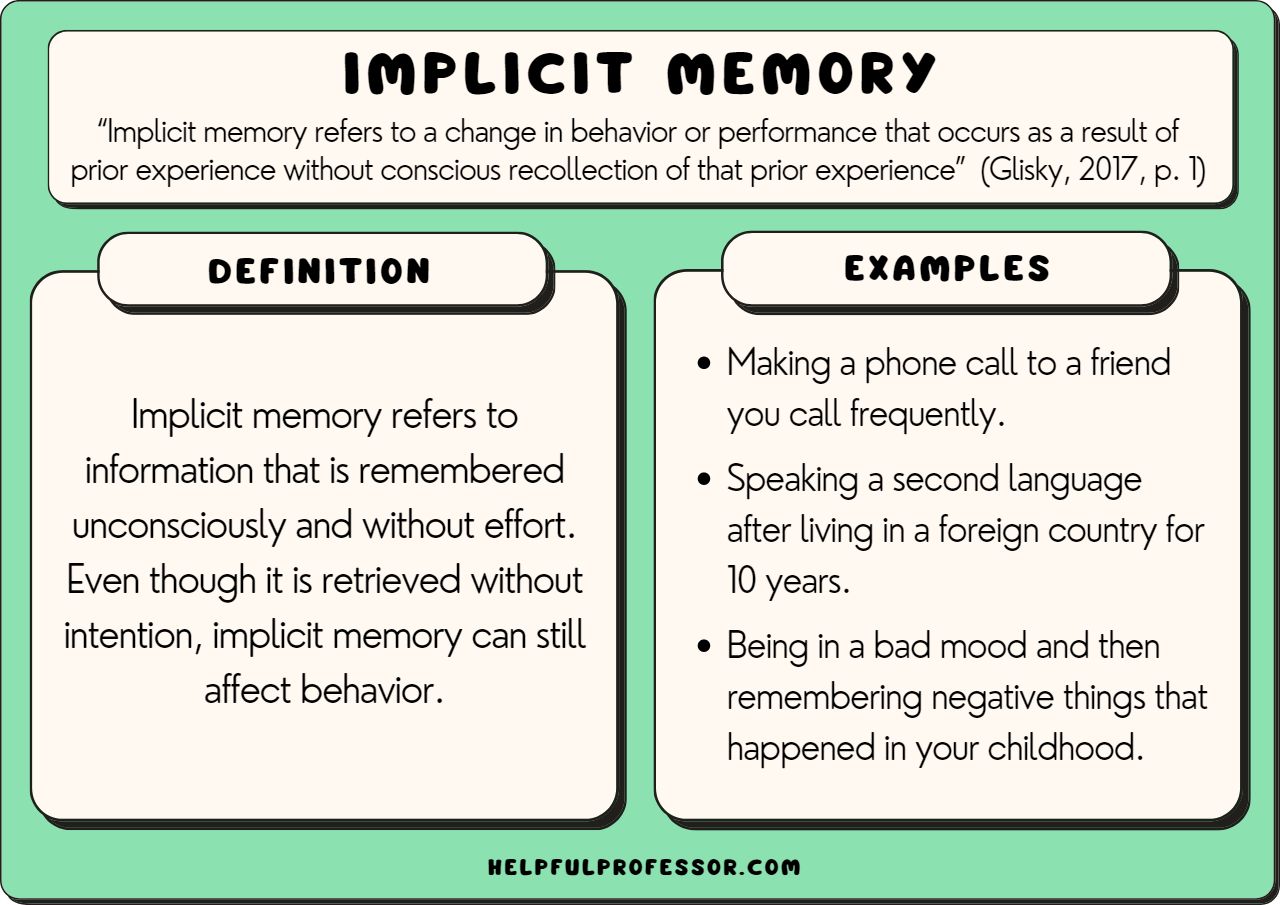Memory is a fundamental cognitive process that encodes, stores, and retrieves information. It plays a crucial role in our daily lives, shaping our experiences, knowledge, and interactions with the world. There are two main types within the realm of memory: explicit and implicit.

Explicit memory, declarative memory, refers to the conscious recollection of past events, facts, or experiences. It involves the deliberate retrieval of information from long-term memory. On the other hand, implicit memory, also known as non-declarative memory, refers to the unconscious influence of past experiences on present behavior without conscious awareness or intentional retrieval.
Explicit Memory: Definition and Characteristics
Explicit memory involves the conscious recollection of information that can be intentionally retrieved. It is characterized by consciously recalling specific details about past events or facts. For example, remembering what you had for breakfast this morning or recalling the name of a childhood friend are instances of explicit memory.
Explicit memory is closely associated with the medial temporal lobe structures, particularly the hippocampus. Damage to these structures can result in severe impairments in explicit memory formation and retrieval. Additionally, explicit memory is subject to decay over time if not actively rehearsed or reinforced.
Implicit Memory: Definition and Characteristics
Implicit memory refers to the unconscious influence of past experiences on present behavior. Unlike explicit memory, it does not require conscious awareness or intentional retrieval. Implicit memory can manifest in various ways, such as improved performance on a task due to prior exposure or changes in behavior based on past conditioning.
One characteristic of implicit memory is its resistance to decay over time. Even if we are unaware of certain information or experiences, they can still influence our behavior or cognitive processes. For example, if you have learned how to ride a bicycle as a child but haven’t ridden one in years, you may still be able to ride it without much conscious effort.
Types of Explicit Memory
Within the realm of explicit memory, there are two main types: episodic and semantic.
Episodic memory refers to the ability to recall specific events or experiences in our lives. It involves remembering the details of a particular event, such as where and when it took place, and the associated emotions and sensations. For example, remembering your high school graduation or a family vacation are instances of episodic memory.
Semantic memory, on the other hand, involves recalling general knowledge and facts about the world. It encompasses our understanding of concepts, language, and factual information unrelated to specific personal experiences. For example, knowing that Paris is the capital of France or that water boils at 100 degrees Celsius are instances of semantic memory.
Types of Implicit Memory
Within the realm of implicit memory, there are two main types: procedural memory and priming.
Procedural memory refers to remembering how to perform certain tasks or skills. It involves acquiring and retaining motor skills, habits, and procedures. For example, riding a bike, typing on a keyboard, or playing a musical instrument are instances of procedural memory.
Priming refers to the unconscious activation or facilitation of information or behavior based on prior exposure or experience. It can occur in various forms, such as perceptual priming (e.g., recognizing a familiar face), conceptual priming (e.g., completing a word fragment with a related word), or semantic priming (e.g., responding faster to the word “doctor” after being exposed to the word “nurse”).
Key Differences Between Explicit and Implicit Memory
There are several key differences between explicit and implicit memory:
1. Consciousness: Explicit memory involves conscious awareness and intentional retrieval of information, while implicit memory operates unconsciously and does not require conscious awareness.
2. Awareness: Explicit memory involves the ability to consciously recall specific details about past events or facts, while implicit memory operates without conscious awareness or intentional retrieval.
3. Retrieval: Explicit memory requires deliberate effort and conscious retrieval of information from long-term memory, while implicit memory can influence behavior or cognitive processes without conscious effort.
4. Processing: Explicit memory involves the encoding, storing, and retrieving information through conscious processing, while implicit memory operates through unconscious processes and can occur without conscious effort.
Brain Processes Involved in Explicit and Implicit Memory
Explicit and implicit memory are associated with different brain processes and neural structures. The key brain regions involved in explicit memory include the hippocampus, amygdala, prefrontal cortex, and basal ganglia.
The hippocampus plays a crucial role in forming and consolidating explicit memories. It is responsible for encoding and retrieving episodic and semantic memories. Damage to the hippocampus can result in severe impairments in explicit memory formation and retrieval.
The amygdala is involved in the emotional aspects of memory. It helps to consolidate emotional memories and forms emotional associations with specific events or stimuli.
The prefrontal cortex is involved in working memory, which is crucial for temporarily storing and manipulating information. It also plays a role in the retrieval of explicit memories.
The basal ganglia are involved in procedural memory, a type of implicit memory involving the acquisition and retention of motor skills and habits.
Factors Affecting Explicit and Implicit Memory
Several factors can influence both explicit and implicit memory:
1. Age: Memory abilities tend to decline, particularly for explicit memory tasks. Older adults may experience difficulties with episodic memory, such as remembering specific details about past events. However, implicit memory tends to be relatively preserved with age.
2. Emotion: Emotional experiences can significantly impact memory. Emotionally charged events are often better remembered than neutral events. This is because the amygdala, which is involved in emotional processing, helps to consolidate emotional memories.
3. Sleep: Sleep plays a crucial role in memory consolidation, particularly for explicit memory. During sleep, the brain processes and consolidates newly acquired information, strengthening memory traces. Adequate sleep is essential for optimal memory performance.
4. Stress: High stress levels can impair both explicit and implicit memory. Stress hormones like cortisol can interfere with memory formation and retrieval processes. Chronic stress can have long-term effects on memory function.
Importance of Explicit and Implicit Memory in Daily Life
Explicit and implicit memory play important roles in our daily lives:
1. Learning and education: Explicit memory is crucial for learning new information and acquiring knowledge. It allows us to remember facts, concepts, and skills necessary for academic success. Implicit memory, on the other hand, can enhance learning by facilitating the acquisition of motor skills or by priming relevant information.
2. Personal relationships: Memory allows us to remember important events, experiences, and details about our relationships with others. It helps us to form and maintain meaningful connections with family, friends, and loved ones.
3. Professional development: Memory is essential for professional growth and success. It allows us to remember important information, procedures, and skills necessary for our work. Both explicit and implicit memory facilitate learning and performance in professional development.
4. Mental health: Memory impairments can significantly impact mental health and quality of life. Conditions such as Alzheimer’s disease or other forms of dementia can result in severe deficits in explicit memory. Understanding memory processes can help diagnose, treat, and manage these conditions.
Implications of Understanding Explicit and Implicit Memory Differences
Understanding the differences between explicit and implicit memory has important personal and professional growth implications. Understanding how memory works can optimize our learning strategies, improve our memory performance, and enhance our overall cognitive functioning.
Furthermore, understanding memory processes can affect various fields, such as education, psychology, neuroscience, and healthcare. It can inform the development of effective teaching methods, interventions for memory disorders, and strategies for improving memory performance in different contexts.
In conclusion, memory is a complex cognitive process that plays a crucial role in our daily lives. Explicit and implicit memory are two distinct types of memory that operate through different processes and neural structures. Understanding the differences between these types of memory can help us optimize our learning, improve our memory performance, and enhance our overall cognitive functioning. Further research and understanding of memory processes are essential for unlocking the full potential of human memory.




